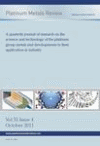-
oa 40th Conference ‘Deutscher Katalytiker’
PLATINUM GROUP METALS AT THE GERMAN CATALYSIS CONFERENCE
- Source: Platinum Metals Review, Volume 51, Issue 4, Oct 2007, p. 185 - 186
-
- 01 Jan 2016
Preview this article:






40th Conference ‘Deutscher Katalytiker’, Page 1 of 1
< Previous page Next page > /docserver/preview/fulltext/pmr/51/4/PMR-51-4-Ilkenhans-1.gif
There is no abstract available.
© Johnson Matthey


